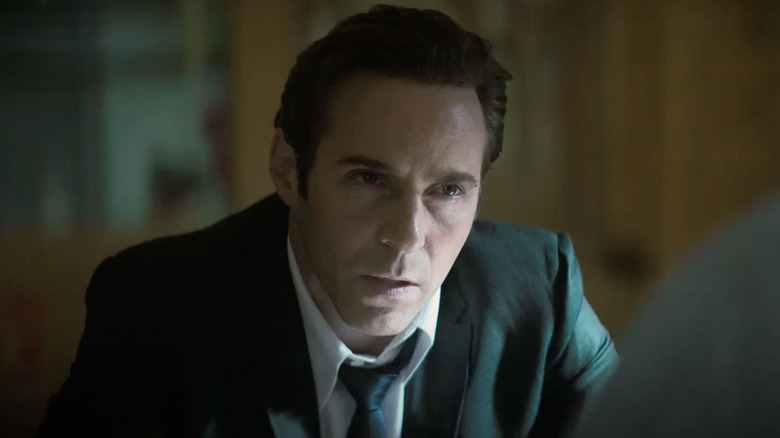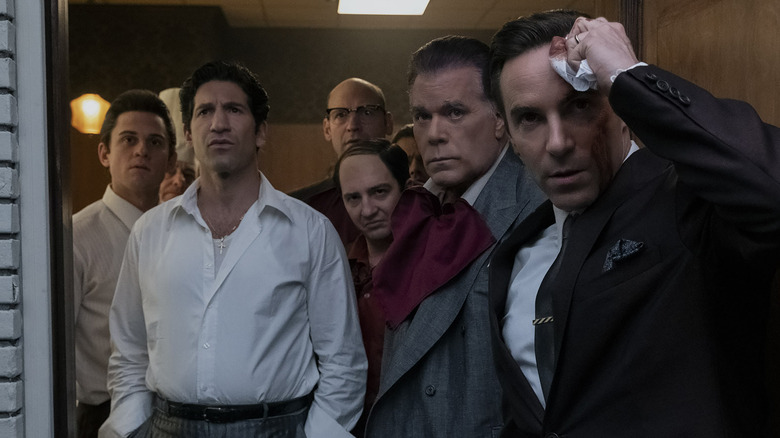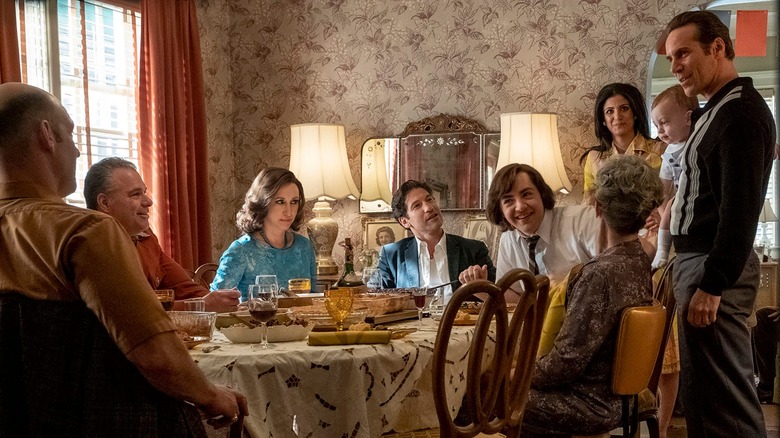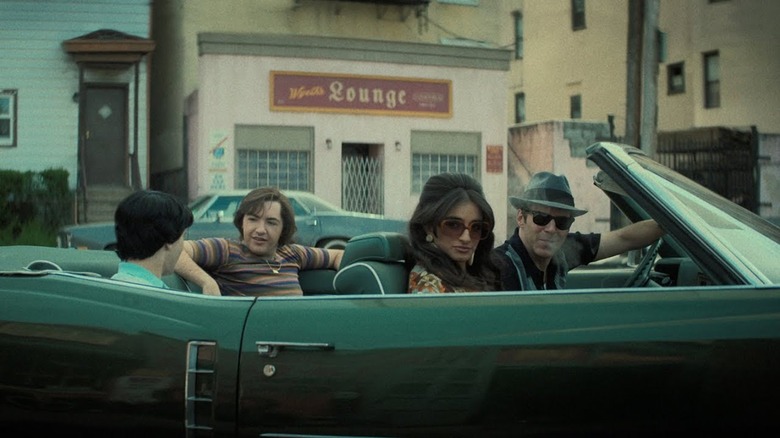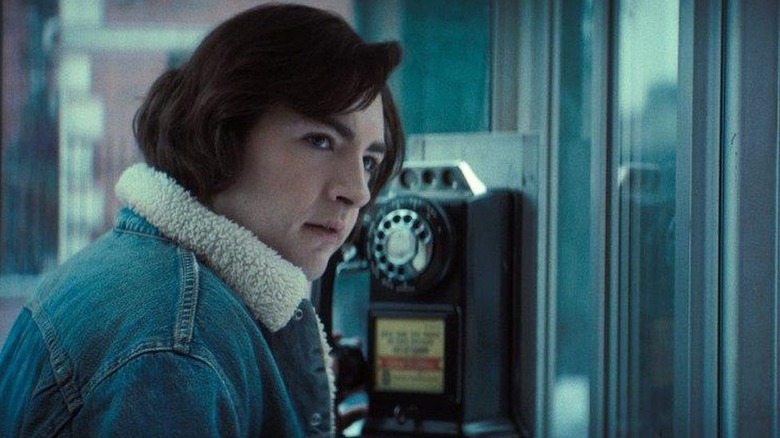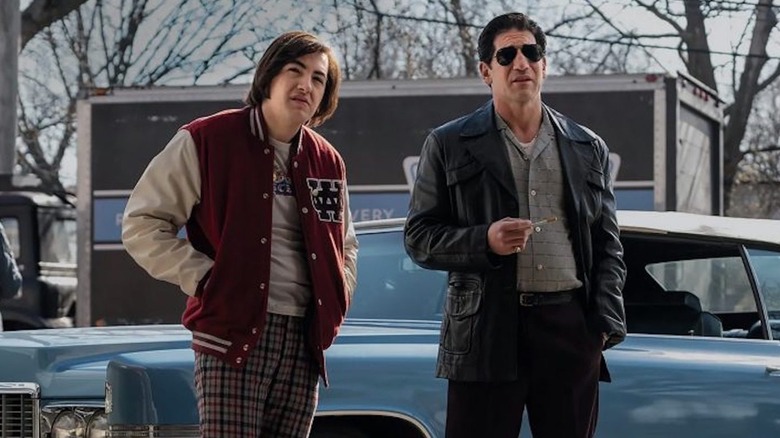The Many Saints Of Newark Director Alan Taylor On The Big Question That Lingers Over The Film [Interview]
Alan Taylor's direction in "The Many Saints of Newark," as "The Sopranos" creator David Chase called it, is "no bullsh*t." Taylor had worked for Chase before, having directed several standout episodes of the original HBO series. And with the prequel film, Taylor was still working directly with Chase. They didn't always see eye-to-eye, even on the ending, but Taylor always felt he was heard by his collaborator.
The director received acclaim for his work in television before he transitioned to feature films with "Thor: The Dark World" and "Terminator: Genisys." Unlike those movies, Taylor had a positive experience making "The Many Saints of Newark," and it shows onscreen. During an interview over Zoom, Taylor told us about his experience with David Chase, what he could do in the film that he couldn't in the series, and the big question that looms over the film.
"He's doomed."
I talked to David Chase yesterday about some of the themes of the show, including death and everyone lying almost all the time. How do you try to visualize his themes?
I think it's a view of humanity that we are terrible judges of our own selves and our own character. We're constantly being dishonest to others and to ourselves. There's something sort of universal about that. It's not a judgmental thing, it's not finding fault. It's just, this is the human condition. I sometimes think that the thing that most distinguishes our species from every other is that we lie. I think a lot of animals don't.
It's sort of beautiful, in a way, to watch them try and navigate that. And it can be in little, petty things. There's a scene where Harold is in bed with his mistress and he talks about having dropped by the recruiting station earlier that day, and it made him think about joining the army. We know that he dropped by to cold-bloodedly murder somebody with a shotgun, but for all purposes he's telling the truth. He's saying, "You know, I was at the recruiting station and it made me think." He's being truthful about what he is talking about, but it's also built into a huge lie. Most of our dialogue is.
I think Dickie is the biggest liar in the movie, but do you think he genuinely wants to do good deeds?
I do think he wants to be the good guy, but he's doomed. The question that hangs over the whole movie is, can we be the person we want to be or are we doomed? Is our destiny locked in? And so, he's lying constantly to himself, but it's for a good cause, in a way. He wants to believe he can escape his father. He wants to believe he can escape that cycle of violence. He does, I think, believe, naively, that if he does enough good things, he will climb out of that. And as you say, he, like all the characters, is sort of lying constantly to himself and others.
It's interesting, his dynamic with Ray's character in the second half of the movie, because Ray can see through lies. That character, Sally, can just see right through Dickie to what, really, the truth is. Dickie keeps telling lies to him, but you can see they're not phasing him at all. He, somehow, is the truest character in the movie. So their dynamic is interesting. It's reminiscent of the Melfi-Tony relationship, I think, in the show.
"It's the worst behavior in the world."
There's a scene in the movie based on a story David Chase heard about a gangster firing a gun at his wife's beehive hairdo. It's shocking in the movie. How'd you approach that scene?
It's terrifying. It's ridiculous. It's the worst behavior in the world. And it is a story that David had told before. And I think he was trying to find a way to dramatize it. And I love the way it's played. I loved the reaction in the backseat of the car to it. And my favorite moment is probably, besides Vera's reaction to it, is at the end when Jon Bernthal settles down and says, "Don't give me that look." He's just done the most ridiculously hateful, violent thing in the world, and he's still, sort of, taking offense. Yeah, it's a classic "Sopranos" scene, I think.
You've said that it would have kept you up at nights, trying to live up to David Chase's vision. Specifically, what kept you up at night ?
Well, if you think about the challenge of this thing, it's insane. It's a very popular show, some people think it's the best TV show ever created. It's certainly on everybody's top lists, so that bar is already ridiculously high. If you try and analyze what the key success of the show was, part of it was that David had taken the classic gangster movie and made it contemporary, and put it on the small screen. And so, here we are going backwards.
We're taking it off the small screen and putting it on the big screen, and we're making it period again. So in a way, you are sort of taking away some of the defining qualities of this show. So the challenge of trying to really figure out, "Okay, what is the heart of 'Sopranos'? What is the core? What's the meaning? What are the themes? What are the questions?" and make sure those get across, is the most daunting aspect of it, I think. Because it is, in so many ways, a continuation of the show, but also very, very different.
"Some people love it, some people are still furious about it."
You've had to deal with fan expectations before, but with "The Sopranos," a part of the appeal of the show is that it doesn't give you what you want. Does that make fan expectations less daunting?
I wouldn't say I would feel relieved, because I think the fanbase is just as fierce about what they think is right and wrong for this world. But you're absolutely right. It's hardwired into it that you're going to do some bait and switch, some expectation denial. And the audience loves that and hates that, because the response to the last scene in the series is so emotional for people. Some people love it, some people are still furious about it.
I love it. Whether he dies there or not, that is the inevitable, that is his ending.
It's funny. If you talk to David about it, at least in my experience, he will never give a straight answer to what happened there. I think that's very important to him. I don't have that same obligation. I give a straight answer. I have a very clear idea of what I think happened in that scene. It was that interpretation that guided me in making the movie. I have to acknowledge that David has never agreed with me when I say that. I think it ended with a bullet in the back of the head, that scene. But you'll never pin David down to that.
I think a part of David believes that there's only a few ways the gangster life ends, and that's the most likely. And there's a very significant thing in the show for me, which was that there's only one line of dialogue that was said as dialogue and then reprised as voiceover, which is when Bacala says, "I guess when the bullet's got your name on it, you don't hear it coming." Which I think is the biggest sign in the world, as to how we're supposed to interpret that final scene. I say all that with the fact that the creator himself will not agree.
"Those are some of my favorite things to shoot."
He has a standard for excellence, obviously. Every little thing is major to him, I imagine, so how is he to work with in that regard?
I was anxious about that a little bit, because everything matters to him so much. But I felt freer in the movie than I did on the show. I think it's because we were sitting close to each other and we were doing it together. So it didn't feel like, like I said before, like he was at a remove and having to send his deputies down to police it. It felt more like a collaboration, in a good way. Often the things he would react to would be things that I didn't get at all. I would be shooting in a certain direction and it would be, sometimes, too pretty for him, and he would want me to make it slightly less pretty.
I learned a lot from him working on the show, and one thing I learned was how to render things in a straightforward way. It's funny, because he's got a very complex way of writing. He withholds the expectations, and contradicts expectations. But there's something sort of straight ahead and powerful about the way the show was shot. I tried to sort of mimic that in the filmmaking on this, as well. It's funny, the details that matter to him are frequently stuff that is out of my orbit, so we get along fine.
A lot of directors always say shooting at dinner tables is tricky, but so much of "The Sopranos" and "The Many Saints of Newark” is just that. How do you approach those scenes?
Those are some of my favorite things to shoot. It's interesting because in a way, you feel like you're locked down, but you don't have to cover it in the way that... I think the television convention is you do a shot at the table and everybody gets a close up, and that's sort of the story. But what I love about these things is, where people are sitting is crucial, who is sharing a frame with who is crucial. Putting the camera in places that are sort of outside of the obvious frontal coverage, where you've got behind people's heads. Or you're stacking some people against other people, and being very aware of what eyelines matter the most and making sure that those are powerful.
I love this stuff. It's a math problem that you have to work out, and a dance you have to choreograph, even though everyone is seated. Maybe I also like it because I'm a control freak. I make the actors stay put so I can decide how to shoot them, and they don't have any choice.
"I shot it like it was a fantasy."
What did the movie allow you to do, visually, you couldn't on the show?
Well, we had more money and we had a bit more time. There are some scenes we did in the movie that were literally in the show, that were flashbacks. Like seeing Johnny get arrested at the playground, and stuff like that, that we had a chance to do in a movie. I think we got to do them for real this time, because we had the resources to do them for real. There are things that are, I don't think, are necessarily straight ahead, like you were saying before about the characters lying. I love Dickie talking about how he's coaching a baseball team.
There's no telling whether that happened or whether that's a total fantasy. I shot it like it was a fantasy, at least in my mind. We got to that location, and for the one day of our entire shoot, fog rolled in. Which was just perfect because it was part of the dreaminess of it. Actually, it wasn't in the script. I sort of added that beat at the end of that sequence where he kind of snaps out of it, and looks around, and Ray's not there anymore.
For me, you're supposed to think, "How much of that is really true? How much of this is a dream?" That quality, I think, is in the show. It's kind of a dreamy, surreal quality. And that's not simply straight ahead. That's a little more off-kilter. I was excited to try and bring some of that to the movie, too.
David Chase said that the additional shooting brought the movie closer to his heart. What was added later?
It's funny, because we started shooting and we had a completed script. But I think David was still a bit itchy about it and didn't feel like he'd resolved some things. And then, the fact that we had to shut down for a bit, and had to pause, gave him time to think. He added not that much, a handful of things that actually made a big difference in terms of shaping the whole experience of the movie.
I think people would be surprised to know that some of these things came at the last second, that they weren't built-in. The way the movie starts is one of them, being in the cemetery and hearing people speaking, that way into the movie.
There's a scene towards the end that echoes an earlier moment between Tony and Dickie. That was, again, added as part of the adjustments, partway through shooting. So we didn't reshoot anything. He just found some things to add because he had that time to reflect, I think.
I could tell he was a lot happier with what we were getting once he put those things in place. He and I still argue about some things. He cut two scenes I didn't want to cut. The ending is something he and I have argued about. For the most part, it was a great collaboration and I felt he was really listening to me. But when it came down to something really concrete, like we disagreed, it's pretty clear who's going to win.
"The Many Saints of Newark" is now in theaters and streaming on HBO Max.
